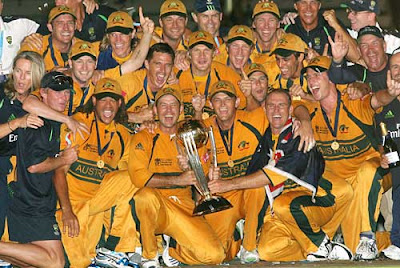
He's the most breathtakingly artistic tennis player to be seen in the last 20 years. He's flamboyant yet consistent, inhumanly skillful yet robotic. He's The One. The only potential GOAT (Greatest Of All Time) since Sampras. Roger Federer plays perfect tennis on his good days, and magnificent tennis on his average ones. And yet, lately, some have had the audacity to call Rafael Nadal 'The One' too. Even if only The Claycourt One. 77 consecutive victories on clay is no joke. Admittedly, Federer's 48 consecutive victories on grass is hardly kindergarten stuff either. Yet, Roger Federer has just seen the rug pulled from under his feet, by a a couple of dirtballers called Guillermo Canas and Filippo Volandri, and Nadal, his exasperatingly exceptional nemesis of the last two years. The All-Surface Grand Slam dream has never seemed more distant. Federer's 4-tournament title drought is cause for worry too, but a very minor one compared to the ever-troublesome Grand Slam challenge. This is GOAT stuff we're talking about - Federer needs that Roland Garros trophy.
What is it about claycourt tennis anyway? Why is it that a surface which produces tiring, artless slug-fests is considered so important to test a player's ability? No tennis follower ever lapses into lyrical nostalgia about the great claycourt specialists. Who remembers Guillermo Vilas, Mats Wilander or Thomas Muster? Well okay, maybe a few do remember these all-time greats, but certainly not in the same vein or numbers as people reminisce about Bjorn Borg, Rod Laver, Pete Sampras, or even Goran Ivanisevic. Pete Sampras never won the French. Heck, he never even reached the final. Sure, Borg did win both Wimbledon and the French five years in a row, but his legend lies more in his astonishing ability to switch between the two surfaces, year after year, than any particular dexterity at 'grinding it out' on clay. I guess what I'm trying to say is that the grass and hardcourt greats, rather, the non-claycourt specialists, have always been considered the more legendary and irresistibly endearing champions, as opposed to the claycourt greats, who've more often than not been consigned to the dreary areas of records and streaks.
Why the big fuss, then, about Federer being unable to stand up to the unshakable clay demon that is Nadal? Maybe it's because a No. 1 player is not supposed to lose as consistently to a single player as Federer loses to Nadal. Maybe it's because the sheer length of the claycourt season is too large to ignore. Or maybe, it's because Federer is, simply, the best player of all time, and so him not being able to win the French can turn out to be a damning indictment of the reasoning behind using different surfaces in tennis. Sigh! If only there weren't all these logical explanations! Then we could all just happily ignore the filthy red surface and rejoice in the jaw-dropping genius of the Swiss maestro.
But we are humans, and blessed as we are with the powers of logic and reasoning, we should necessarily agree that Federer has to win at Roland Garros. The bad news is that he's in worse form than he's been at any time in the past 3 years. And oh, he's just split with his coach Tony Roche, and will travel without a coach to Paris. Most worryingly for him, however, Nadal is playing almost perfect claycourt tennis, and it's pretty much a given that Federer will have to defeat Nadal to win the tournament that Nadal has won almost effortlessly for the last 2 years. Impossible? Well, it does seem pretty bleak right now. But doing the impossible shouldn't be that difficult for the GOAT (I know, I'm using the term far too often, but I've taken a strange liking to it). This is Roger Federer we're talking about. The man who can make the Roddicks, Hewitts, Blakes and even Agassis of this world look like mesmerized bystanders. Surely he can turn it around in time? Surely Nadal has to suffer an injury sooner or later?





